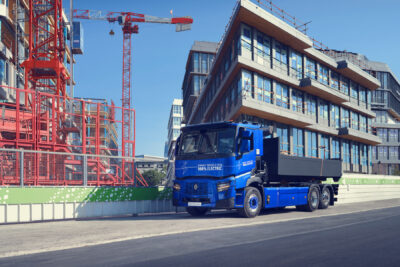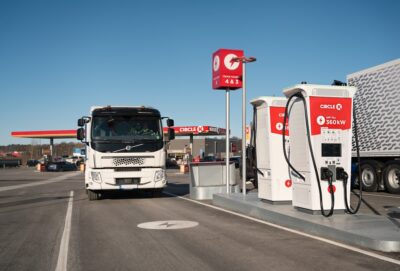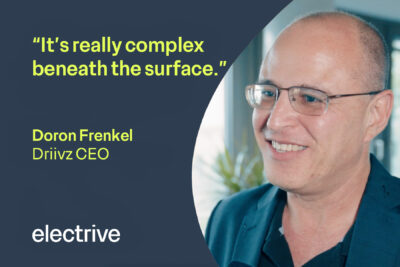1,000 km with hydrogen: Mercedes-Benz shows what the GenH2 truck can do
At the end of the so-called #HydrogenRecordRun, another Daimler truck stood in the way of the manufacturer’s hydrogen truck. While a crowd of journalists gathered in Berlin’s Minister Gardens, cameras in hand, waiting for the GenH2 truck to cross the finish line, the vehicle had come to a standstill one street over. The truck of the future was stopped in its tracks by a counterpart from the present. A red Mercedes Benz Arocs with a diesel engine was setting up a construction site, the excavator shovel already swinging through the air. And the intersection is blocked.
But the delay only lasted a few minutes, as documented by a camera drone that the Daimler Truck PR team had specially set up in Berlin’s city centre. Andreas Gorbach took it with a sense of humour: “That’s real life. A truck sometimes stands there and does what it’s made for,” said the Member of the Board of Management at Daimler Truck AG, who was responsible for development and personally sat behind the steering wheel for the last few metres of the record-breaking drive. He skilfully manoeuvred the GenH2 truck into the narrow driveway of the ministerial gardens. “My team was afraid I’d scratch it,” Gorbach admitted after climbing down from the cab. This worry was unfounded.
With the record drive from Wörth am Rhein via Dortmund, Hanover and Hamburg to Berlin, Daimler Truck wanted to demonstrate that hydrogen fuel cell technology can be a good solution for decarbonising long-distance road transport. Ultimately, the hydrogen truck drove 1,047 kilometres on one tank of liquid hydrogen, a figure confirmed by TÜV Rheinland. The day before, the GenH2 truck was fully loaded and started in Wörth with a permissible total weight of 40 tonnes. The two 40-kilo tanks, each mounted on the side of the chassis, and the additional battery charging connection were sealed.
For Daimler Truck AG, liquid hydrogen is both a blessing and a curse. So far, it is not available anywhere in Germany. At its truck plant in Wörth, the manufacturer only has a provisional H2 filling station. However, a regular one will open in a few weeks. But there is no other infrastructure for the energy source. That is why the GenH2 truck cannot set any more records on its return trip to Wörth. It cannot drive home on its own and had to be loaded on a semi-trailer.
For Gorbach, this is no reason to doubt the technology: “We need hydrogen to complement our battery-electric trucks. And we need hydrogen for decarbonisation anyway,” he said at the subsequent panel discussion. He wants to stick to the dual strategy, pursuing battery and fuel cell technology. And he would prefer liquid hydrogen as an alternative to gaseous form. Incidentally, this was supplied by Air Liquide and is made from renewable energy. During refuelling, extremely cold liquid hydrogen (-253 degrees Celsius) was pumped into the two tanks. Due to the tanks’ excellent insulation, the hydrogen can be kept at a low temperature sufficiently long without active cooling.









Gorbach also used the GenH2 truck’s record-breaking journey to Berlin to appeal to politicians. They must step up the infrastructure development for alternative fuels, ensure sufficient green energy and create the necessary framework conditions so forwarders switch to the new electric vehicles. ” It’s a competition with diesel,” said Gorbach. In any case, the bottleneck in the electrification of road freight transport is not the vehicles but the infrastructure and competitiveness. “We have to make transport with diesel more expensive. That is the price of CO2-neutral transport.” The manager appeared hell-bent on delivering the new electric trucks with a battery or a fuel cell as planned.
“Hydrogen is anything but hot air when it comes to trucks, and we are making progress on the road to series production,” Gorbach added. Whether liquid hydrogen, in particular, has a chance on long-distance routes will only become clear in a few years. According to Daimler Truck, the development is on schedule and the Mercedes-Benz GenH2 truck will be ready for series production in the second half of the decade.
However, the battery-electric eActros 600 will launch before that. The world premiere of the series version is just two weeks away. So, Daimler Truck itself may put the biggest competitor to hydrogen (besides diesel) on the road. There are currently no charging stations in the megawatt range for record-breaking journeys between Wörth and Berlin. But with the HPC charging parks for electric cars, there already is a viable alternative for making the journey there and back on its own wheels.
Author: Peter Schwierz, Editor-in-Chief






0 Comments